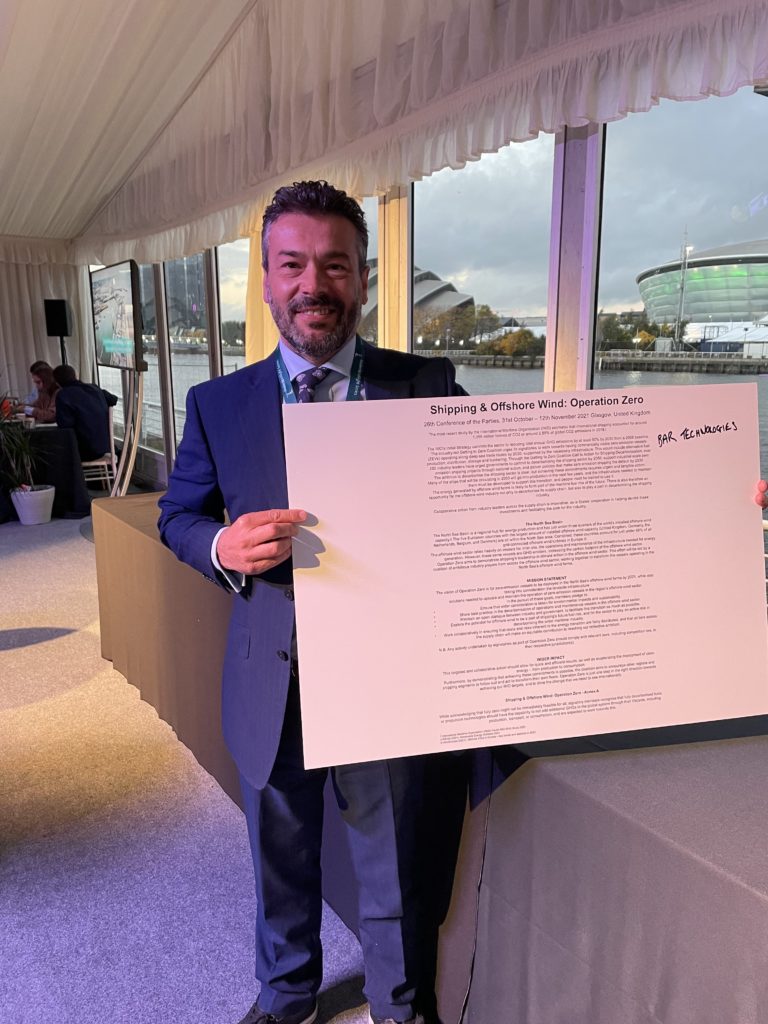BAR Technologies joins 28 strong industry cohort as founding signatory of ‘Operation Zero’
Industry declaration commits to the development of zero emission vessels for the offshore wind support sector by 2025

Glasgow, 10th November 2021 – BAR Technologies, an innovative simulation-driven marine engineering consultancy, joins a cohort of nearly 30 maritime and energy companies in signing a jointly developed zero carbon declaration, “Operation Zero”, yesterday evening at COP26.
Operation Zero is a collective statement of intent for the deployment of zero emission vessels (ZEVs) across the North Sea’s offshore wind farms by 2025, along with the development of supporting shoreside infrastructure to scale up and maintain this advanced, environmentally sustainable fleet.
The Getting to Zero Coalition Call to Action for Shipping Decarbonisation, driving the adoption of ZEVs on international deep-sea trade lanes by 2030, unlocks the potential for shoreside infrastructure and zero-carbon bunker fuel development to be powered by renewable electricity from the growing offshore wind sector. For this strategy to be truly viable as a vehicle for zero emissions shipping, the coalition recognises that a more concerted effort is needed to address emissions performance within the offshore wind supply chain.
Operation Zero aims to demonstrate shipping’s leadership in climate action in the offshore wind sector, utilising ambitions, expertise and leadership from the coalition of signatories to reduce the carbon footprint of the offshore wind sector, and by extension the energy supply chain to the decarbonisation of international shipping. This work begins in the North Sea Basin which houses wind farms from Europe’s top five countries by wind capacity – United Kingdom, Germany, the Netherlands, Belgium, and Denmark – who together account for almost 98% of all grid-connected offshore wind turbines in Europe.
BAR Technologies contributes its unique blend of industry expertise across maritime, Americas Cup yacht racing, F1 racing, aerospace engineering, and beyond to advance the efficiency of offshore energy support vessels (OESV). Commercially the company is already introducing hydrofoil technology to the CTV space with its Foil Optimised Stability System (FOSS), as well as developing an entirely new vessel design in the BARTech 30, developed in partnership with naval architect Chartwell Marine, which forecasts energy efficiency improvements of 30% against current vessels.
John Cooper, CEO, BAR Technologies, said: “We are very proud to have been part of the consortium that developed and signed Operation Zero. We all know there is no single silver bullet in the ambition to reduce emissions from shipping and that success will depend on a combination of solutions, so this kind of collaboration is hugely important to generating a foundation of knowledge and expertise on which technologies can build.
“We have already seen the kind of progress that can be achieved through collaboration in our commercial partnerships, and we look forward to promoting this same spirit within the offshore wind space to cut down carbon emissions and facilitate the provision of truly renewable energy for shipping.”
The signing ceremony took place this evening and opened with a speech from the Director of Maritime for the UK’s Department of Transport, Petra Wilkinson, followed by statements from guest speakers Andrew Jamieson, CEO of ORE Catapult, and Kenneth Coughlan, Naval Architect – Offshore Service Logistics at Siemens Gamesa Renewable Energy.